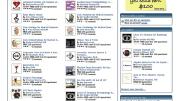The image is grim: “binge and purge” learning. It’s what students do when they cram for a test: consume subject matter in a large lump (binge) and then spit it back on the exam (purge). This mode of study doesn’t seem to produce durable learning. During the past four years, associate professor of surgery B. Price Kerfoot, M.D. ’96, Ed.M. ’00, has developed a scheme that’s more like grazing: “spaced education.” More than 10 rigorous studies on medical students and residents using randomized trials have shown its efficacy: it can increase knowledge by up to 50 percent, and strengthen retention for up to two years. Furthermore, students report enjoying spaced education; its website (www.spaceded.com) even calls it “addictive.”
The website offers, online, the first courses structured in this mode. (Harvard has applied for a patent on the technology, and already licenses it to an Internet start-up company, SpacedEd.) The methodology, which Kerfoot, a urological surgeon, invented, breaks information down into discrete packages and then applies two learning principles that he gleaned from the psychological literature on learning and memory. The first principle is the spacing effect—“When you present and repeat information over intervals of time [as opposed to “binges”], you can increase the uptake of knowledge,” he explains. “And it’s encoded in ways that cause it to be preferentially retained.” The second principle is the testing effect: “When you present information in a ‘test’ format, rather than just reading it, long-term retention is dramatically improved.”
Kerfoot had his interest in education and educational reform sparked when, as a student, he took part in the Medical School’s New Pathways curriculum. During his residency, he also earned a master’s degree at the Graduate School of Education. He knew that Web-based teaching modules are a gold standard for online education, but in a study done at four medical schools, Kerfoot found that “most students hated them and long-term retention was quite poor. Why waste a week of their time and $1,000 of their tuition teaching them about a medical subspecialty when the knowledge will disappear from memory in five to 12 months?”
In contrast, spaced education “turns online education on its head,” he asserts. Instead of a test at the end of the course, it presents the material itself entirely in a test-question format. New information appears when the correct answer is explained and elaborated upon. (The online courses have an “answer blog” at the conclusion of each explanation, for students’ comments and discussion.) Typically, a course contains 20 to 40 questions, spread across one to two months. The spacing depends on the student’s answers: an incorrectly answered question might repeat one week later, for example, and a correctly answered one after three weeks. After two consecutive correct answers, a question is retired.
Close to home, Kerfoot used Spaced Ed to improve prostate-cancer screening by 95 primary-care providers at the Veterans Administration Medical Center in Jamaica Plain, where he works. Participants showed a 26 percent decrease in inappropriate cancer screenings, saving money and minimizing patients’ anxiety. (The SpacedEd website offers discussion boards where students can hash out controversial medical practices like the prostate-specific antigen [PSA] test.) Kerfoot is also going global, having just completed a spaced-education randomized trial on urology clinical-practice guidelines involving 1,470 surgeons in 63 countries.
There are now dozens of courses on the SpacedEd website, which went live in May. Many are for doctors and medical students, but there are also offerings on bartending, iPhone tips, and music theory (which includes video of the instructor playing his guitar in each question). Nearly all are free; a few have very modest fees—$1.99 to $9.99. Kerfoot feels that the platform can work with almost any type of course, including K-12 education, and plans to enlist teachers all over the world to develop the curriculum, with course authors keeping 60 to 80 percent of the revenue if there is a tuition fee. His ambition is to cultivate a “social learning community” where course authors and students interact online, becoming engaged in creative and effective courses and generating comment and discussion on the curricular topic. “Our goal is to get the methodology out beyond the Harvard firewall,” he says. He’d also love to see a course in Spanish, which he has studied three times previously. As he says, “I won’t have to forget it a fourth time.”









